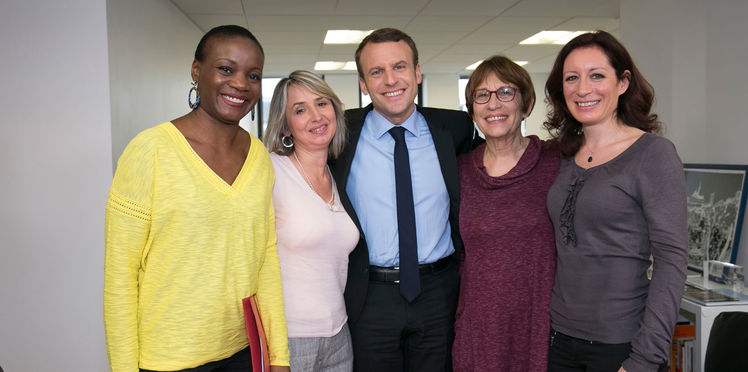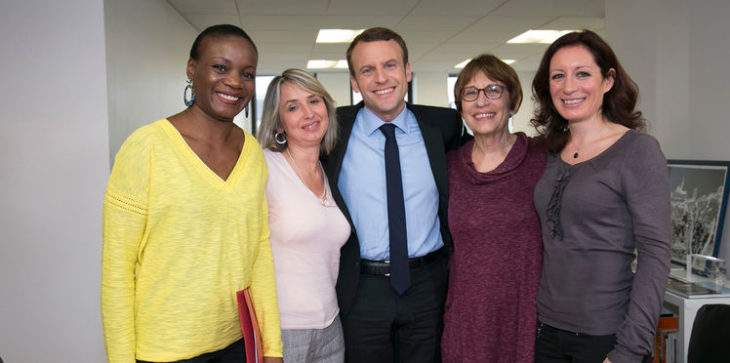Emmanuel Macron faces the readers : his program, his convictions

 Emmanuel Macron answered the questions of our readers, curious to know more about his convictions, his projects, but also impatient to discover the man. A friendly, frank and direct moment.
Emmanuel Macron answered the questions of our readers, curious to know more about his convictions, his projects, but also impatient to discover the man. A friendly, frank and direct moment.
That day, in early March, at his Paris headquarters, Emmanuel Macron is preparing to receive the former mayor of New York, Michael Bloomberg, before leaving for Bordeaux, where he holds a meeting the same evening. A day of banal campaign, a hundred an hour, where meetings, appointments and interviews are linked. In this calendar, the candidate of En marche! Took the time to receive four of our readers to address issues that concern them or challenge them.
HEALTH
Véronique : For optical and dental care, you promise a “zero charge” for the patient. How can this be achieved without raising the tariffs of mutuals?
Emmanuel Macron : Today, there is no real transparency in the mutual insurance market. As a result, the most modest patients and part of the middle classes – who do not benefit from CMU – do not have adequate coverage. I am going to set up a limited number of reference contracts to compare very simply the offers by price, type of reimbursement, for the same basket of care. As for dental care, I want to see better care reimbursements for current care. My goal is to achieve this by 2022, in consultation with health professionals. That will be the subject of a law.
Magalita : You advocate the sale of drugs to the unit . But the measure worries the pharmaceutical industry …
EM : We must end the mess. We do not have this culture to bring back the unused drugs to the pharmacist. The unit packaging that I offer is relevant, modern and a real lever to reduce our expenses. We must not yield to the pressure of the pharmaceutical industry on this point. I intend to negotiate with them about the price of the drug to give them visibility but, in return, I ask them to develop the drug unit. I will make it a criterion of reimbursement.
Current Widow: The generalized third-party payer, which allows no doctor to charge a fee, is due to come into effect at the end of 2017. You want to turn it into a generalized payable third party. That is to say ?
EM : Doctors will be able to implement it on a voluntary basis. I do not want to make it mandatory. Many doctors are worried about the late reimbursements of the mutuals, from which they will have to take the steps to be paid. And then, this feeling of a free service is also badly perceived by one part of the profession. So I do not impose anything. I will not force doctors to adopt third-party payment.
Michèle : The 40,000 health students will be doing a “health service” to support school nurses and occupational physicians. What will be their missions and how to integrate this service into their studies?
EM : It will be a quarter, integrated into their studies. Students will go to the field, to schools, to businesses. I would like them to intervene as a matter of priority in schools in disadvantaged areas where children often do not consult a pediatrician. These preventive sessions will make it possible to spot on hearing, vision, dyslexia, for example. In high schools, they can intervene on addictions, and in companies, on risk behaviors. These are not, of course, medical acts, but prevention, awareness-raising.
EDUCATION
Claire : The government has made schooling in kindergarten from 2 years a priority in priority education networks. You do not talk about it in your program. What is your point of view ?
EM : I am in favor of schooling in kindergarten from 2 years, but opposed to the idea of making it mandatory. At the same time, I want to develop childcare facilities, increase the number of crèches and places available, making assignments transparent. A digital platform will indicate the number of places available, the selection criteria. This will allow us to respond to specific needs and to put an end to the right-of-way.
Véronique : You are in favor of autonomy of the teaching teams. What would be their room for maneuver, especially for the students most in difficulty?
EM : It is essential that the pedagogical communities have autonomy, that they can develop their own pedagogical projects. Currently, assignments are decided from above, in a uniform and blind manner. There are thus teachers without experience in the most difficult areas. I want the teams to be able to build projects and the teachers who join them can apply. As for those who work in more sensitive areas, they must be substantially better paid. I propose that teachers in PWR + [priority education network] be entitled to an annual premium of 3,000 euros.
FA : Benoît Hamon reproaches you for setting up an unequal system …
EM : He caricatures my project. It is not liberalism, as he claims. Liberalism exists today: that which consists, for the parents who can, to take their children out of the public school to put them in the private. I have nothing against it, personally, since I followed my schooling in both. I do not want to revive the public / private war, which I find barren. But if we want the public school to be attractive and competitive, we need to give the educational teams room for maneuver. I am not dogmatic.
Véronique : How will teachers be evaluated?
EM : It is the condition and the equivalent of autonomy. In a spirit of accountability, the evaluation should be simpler, more permanent, and take into account the opinion of the head teacher, who measures the motivation of the teacher. Consideration should also be given to the views of the students themselves and their parents.
Current Woman : Violence in school is a reality. What do you suggest ?
EM : I want to deploy a daily security police around the school that needs to be much more present. Violence is not built in the institution, it comes from outside.
Magalita : You explain that the municipalities that wish it will be able to return on the reform of the rhythms school . Is that a questioning?
EM : It was not the priority of the school. There were other emergencies. However, I am not inclined to unravel everything. I prefer pragmatism, leaving the possibility to the municipalities that wish, in consultation with local actors, to get out of this arrangement. Many municipalities are now in a deadlock, financially and in terms of organization.
Claire : For children with disabilities, you want to recruit more auxiliaries of school life (AVS). At the beginning of the school year, each child concerned will have an AVS at his side?
EM : I make that commitment. It will be a terrible battle, because the election will have taken place shortly before. But you can not leave classes without AVS. My priority is to help people with disabilities live a normal life. It is known that the presence of children with disabilities alongside able-bodied children is beneficial to both.
SOCIETY
Michèle : Are you in favor of compulsory paternity leave to reduce the professional inequalities between men and women?
EM : I am in favor of longer paternity leave. Currently 11 days, I will carry it to 20 days. Valued, it will encourage more men to take it. It is a strong measure for equality between women and men. On the other hand, I am opposed to the idea of making it mandatory.
Magalita : Opposed to the GPA (gestation for others), you want to give a true legal status to the children born of a surrogate mother abroad. That is to say ?
EM : We are very hypocritical on this issue. If I defend, of course, the law on marriage for all, we have not solved the problem of filiation. I will not open the debate on GPA. I am opposed to it. I will fight internationally this form of modern slavery. On the other hand, I will fight to recognize the children born abroad of surrogates, because they have no legal existence on French soil. It is not normal to penalize them, they must be given a status. In this respect, the Taubira circular does not solve the problem. Only parents who manage to struggle in the legal maze or who have relationships do so. So I want to clarify that for all the parents involved.
Claire : You do not want to go back to the law that criminalizes the possession of cannabis. You were, for a time, in favor of sanctioning it by simple contraventions. Why have you changed your mind?
EM : There is a confusion between legalization and the nature of the sanction. I am against the legalization of cannabis : there is no ambiguity on this point. But in the current situation, cases involving cannabis owners for their own consumption are, by an overwhelming majority, dismissed or merely reminded of the law. The penal response is therefore ineffective today. That is why I propose to introduce fines that are immediate and truly dissuasive in order to punish offenders on the spot.
ECONOMY
Michèle : You want to restore a day of deficiency in the public service, a measure introduced in 2011 by François Fillon and suppressed in 2013. Why revive it?
EM: How to justify this difference between private and public? I can not explain it to the employees. Nothing justifies this day of deficiency among the civil servants. It encourages absenteeism, as the figures show, and it is expensive for public finances. I prefer to re-establish it and, at the same time, better value deserving public servants. It’s a management issue. Institutions, hospitals and communities must be given more resources to pay them more.
“Brigitte, the woman of my life”
“It’s my wife, the wife of my life. We decided to build a life together, even if the social representations were not necessarily with us. Brigitte has suffered more than me. Even today, when I see certain imitations or magazines, it is ordinary misogyny. If the age ratios were reversed, everyone would find it formidable. Our history taught me a lot. One never builds oneself in the gaze of the other. It took a lot of intelligence for his children to accept me. This is built up over time. “







